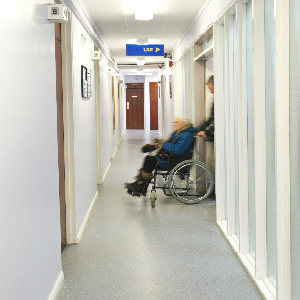Hospital re-admissions within one month ‘have risen by a fifth’

Emergency re-admissions within 30 days of leaving hospital have risen by a fifth in the last seven years, with potentially preventable cases increasing by over 40%, according to new research.
The report, jointly produced by the Nuffield Trust and Health Foundation, raised questions about the quality of care that elderly patients receive during their time in hospital, as well as how they are discharged and the quality of community and social care services.
GP leaders said the ‘revolving door’ of re-admissions to hospital would only end when NHS and social care was ‘adequately resourced’.
The analysis revealed that the number of patients being re-admitted to hospital in an emergency with potentially preventable conditions such as pneumonia and pressure sores has grown significantly since 2010/11.
Researchers looked at hospital data detailing patient diagnoses and the reasons behind emergency hospital re-admissions between 2010/11 and 2016/17, with the aim of highlighting where improved quality of care in hospitals or the community might have prevented re-admission.
They saw that over that period the total number of 30-day emergency re-admissions to hospital in England increased by 19.2%, from 1,157,570 to 1,379,790.
Meanwhile, the total number of hospital admissions increased by 10.5% from 15,527,166 to 17,162,662.
The report also identified a 41.3% rise in emergency re-admissions for conditions classified as potentially preventable.
These included patients with conditions such as pneumonia, pressure sores or venous thromboembolism, that were not diagnosed when the patient was first admitted to hospital.
Notably the number of patients re-admitted to hospital in an emergency with pneumonia increased by 72.5% over the seven years, an increase larger than the overall increase in pneumonia cases, while those re-admitted with VTE also grew by a third.
The authors admitted changes in coding practices, an ageing population and an increase in multimorbidity may have contributed to the trends.
However, study author and Nuffield Trust research analyst Jessica Morris said: ‘Emergency readmissions to hospital, for conditions that were not diagnosed during their first visit, are potentially a warning sign that a patient’s quality of care may have been compromised.
‘The findings provide local health providers with a good opportunity to sit up and focus their attention and quality improvement initiatives on the three conditions where we’ve seen the most significant rise in readmissions.’
East London GP and Tower Hamlets LMC chair Jackie Applebee claimed that ‘hospitals are encouraged to discharge patients into the community, which does not have the capacity to cope’.
She said: ‘Social care has been cut even more than health care, general practice is struggling to survive and community nursing is in a parlous state. The main problem is that there is simply not enough staff in the NHS to provide the care that our patients deserve due to the unprecedented funding squeeze.’
‘The revolving door of patients being discharged too early, too ill to be coped with in the community, so being readmitted will only stop when the NHS is adequately resourced.’
Reducing emergency re-admissions
This comes after a study found that patients who saw the same GP over time were less likely to be admitted to hospital.
The research said that if older patients saw their most frequently seen GP two more times out of every 10 consultations, there would be a 6% decrease in admissions.
The British Red Cross has warned that a lack of appropriate safeguards has led to frail and elderly patients being in an ‘endless cycle’ of re-admissions into accident and emergency departments.
The charity raised a number of concerns not only regarding those who are discharged without support, but those who remain stuck in hospital due to a lack of care at home.
Visit Pulse Reference for details on 140 symptoms, including easily searchable symptoms and categories, offering you a free platform to check symptoms and receive potential diagnoses during consultations.









